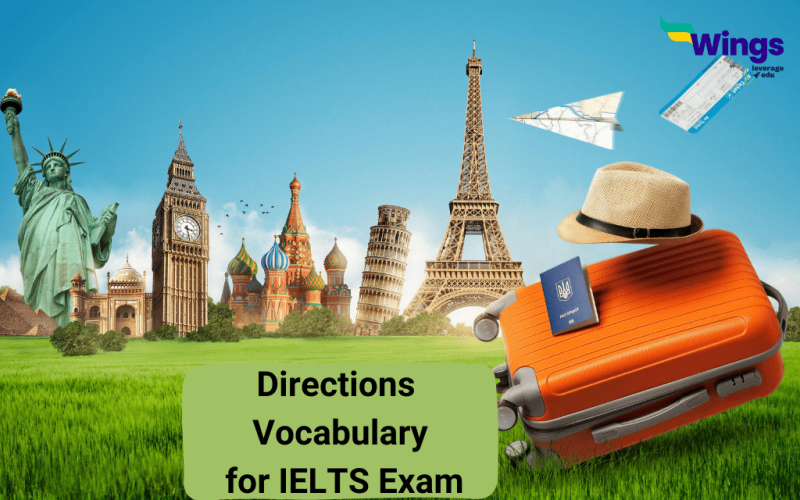In today’s interconnected world, the ability to navigate and communicate directions effectively is crucial. The International English Language Testing System (IELTS) often includes questions related to giving and understanding directions. This essay aims to explore essential vocabulary related to directions, empowering IELTS test-takers with the linguistic tools needed to excel in this aspect of the exam.
Having a strong command of vocabulary related to directions is essential for success in the IELTS exam. By mastering the vocabulary presented in this essay, test-takers can confidently give and understand directions, greatly improving their chances of achieving high scores. This blog article will focus on the commonly used directions vocabulary for IELTS. Keep reading the blog to know more.
This Blog Includes:
Basic Vocabulary for Giving Directions
When giving directions, it is vital to use clear and concise language to ensure effective communication. Here are some key terms to master:
- Turn left/right: Indicate the directions for a specific turn.
- Go straight ahead: Instruct to continue in the same direction without turning.
- Take the first/second/third/fourth street: Provide details on which street or road to take.
- Cross the road/street: Explain the action of moving from one side of the road to the other.
- Walk for [distance]: Specify the approximate distance to travel.
- It’s on the left/right-hand side: Indicate the location of a place relative to the person giving directions.
Also Read: 100+ Common Metaphors with Meanings
Vocabulary for Receiving Directions
When understanding directions, active listening and comprehension skills are essential. Familiarize yourself with the following terms:
- Excuse me, can you help me find…?: A polite way to seek assistance when lost.
- Could you repeat that, please?: Ask the person to repeat the directions if they were unclear.
- I’m sorry, I didn’t catch that: Express confusion or difficulty in understanding.
- Could you show me the map?: Request visual aid to better comprehend the directions.
- Is it far from here?: Inquire about the distance to the destination.
Vocabulary for Locating Places
To effectively locate places, knowing specific vocabulary related to different landmarks and facilities is crucial. Consider the following terms:
- Bank: A financial institution where money can be deposited, withdrawn, or exchanged.
- Hospital: A medical facility where people receive treatment for illnesses and injuries.
- Restaurant: An establishment that prepares and serves food and beverages.
- Post office: A facility where mail is collected, processed, and delivered.
- Museum: A building where artefacts and artworks are displayed for public viewing.
Vocabulary for Public Transportation
Public transportation plays a significant role in navigating cities and towns. Acquaint yourself with these terms to discuss or understand public transportation options:
- Bus stop: A designated location where buses pick up and drop off passengers.
- Train station: A facility for boarding and disembarking trains.
- Subway/metro station: An underground railway system for public transportation.
- Taxi rank: A designated area where taxis line up to pick up passengers.
- Platform: A raised area where passengers wait for trains or buses.
Also Read: Powerful IELTS Advanced Vocabulary Words
Tips to Learn Directions Vocabulary for IELTS
Learning directions and vocabulary for the IELTS exam can be made easier with the following tips:
- Start with Basic Vocabulary: Begin by familiarizing yourself with essential terms such as “turn left/right,” “go straight ahead,” and “cross the road/street.” These fundamental terms form the foundation of directions vocabulary.
- Use Visual Aids: Visual aids like maps, city plans, or GPS applications can provide a visual representation of directions. Use them to reinforce your understanding of specific locations and landmarks. Practice locating different places on maps and tracing routes to enhance your spatial awareness.
- Contextualize Vocabulary: Incorporate directions vocabulary into real-life situations. Imagine scenarios where you ask for directions or give directions to others. This will help you internalize the vocabulary and make it more relevant.
- Utilize Authentic Materials: Engage with authentic materials such as travel guides, city maps, or brochures. These resources often contain descriptions and directions to various places of interest. Reading and understanding these materials will expose you to a wide range of vocabulary related to directions.
- Listen to Audio Resources: Listen to audio recordings or podcasts that provide directions. Pay close attention to the vocabulary and practice visualizing the directions in your mind. This exercise will improve your listening skills and reinforce your understanding of directions vocabulary.
Also Read: How to Prepare for IELTS?
Incorporate these tips into your study routine, and you’ll be well-prepared to excel in the directions-related questions on the IELTS exam.
FAQs
Directions vocabulary is essential for the IELTS exam, particularly in the speaking and listening sections. Test-takers may be asked to speak or understand directions, describe routes, or discuss navigation in different contexts.
While specific vocabulary words tested in the IELTS exam can vary, some common directions-related terms frequently appear. These include
(1) Turn left/right
(2) Go straight ahead
(3) Cross the road/street
(4) Take the first/second/third/fourth street
(5) It’s on the left/right-hand side.
To practice directions vocabulary effectively, consider engaging in various activities. These can include role-playing conversations where you give or receive directions, listening to audio resources that provide directions, utilizing flashcards for vocabulary review and using language learning apps.
Candidates who want to prepare for IELTS or any other language proficiency test, can Build a plan with Leverage Edu‘s Leverage Live classes and our top trainers and strengthen your English score as well as your application so that you can secure your spot in your dream college. Fulfil your dreams of studying abroad with Leverage Edu, to get a free counselling session, reach us at 1800572130.


 One app for all your study abroad needs
One app for all your study abroad needs












 60,000+ students trusted us with their dreams. Take the first step today!
60,000+ students trusted us with their dreams. Take the first step today!